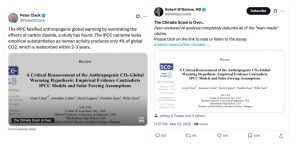We’ve noticed a paper being shared on X alongside the claim that it disproves “global warming data.” A prominent feature of this paper is that it was authored by X’s AI chatbot, Grok 3, and that it has been both published and peer reviewed. The paper is being cited as proof that current established climate research must be “critically reassessed.”
The Intergovernmental Panel on Climate Change (IPCC) is a United Nations body that assesses climate change and issues recommendations for policymakers. IPCC assessment reports clearly emphasise the stance that human activities have “unequivocally caused global warming…principally through the emissions of greenhouse gases.” This stance is also the current scientific consensus, despite a minority of scientists holding opposing views.
However, according to the viral posts pushing this claim, the paper shows that the IPCC “falsified anthropogenic global warming by overstating the effects of carbon dioxide.” One viral post even uses the headline “the climate scam is over.”
Is there any truth to this claim? Before even assessing the content, we took a look at the facts surrounding the paper and its publication.
Publication and Review
The paper, which is titled: “A Critical Reassessment of the Anthropogenic CO2-Global Warming hypothesis” was published in March 2025 in a journal called “Science of Climate Change.”
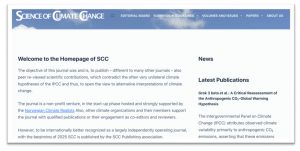
Founded in 2021, the journal is an open-access journal publishing scientific works which “open the view to alternative interpretations of climate change.” The Science of Climate Change is “hosted and supported” by a Norwegian organisation called the Climate Realists, which strongly disagrees with the IPCC that CO2 emissions change the climate and self-describes its purpose as “influencing the climate debate both nationally and internationally.” The journal is published by a publishing company of the same name (and which was founded in 2025).
While being published in a fringe journal does not automatically discredit the paper’s content, it is important to consider the journal’s credibility and motivations as a factor alongside other publishing procedures. For instance, while claim posts have emphasized the paper has been “peer reviewed,” the review process disclosed by Science of Climate Change does leave some questions unanswered. The standard practice for peer review involves at least two qualified reviewers in an anonymous process where reviewers provide feedback, critique, and recommend changes. As other established journals and widely followed peer review guidelines state, it is important for the reviewers to be independent from the authors and for any conflicts of interest to be declared or avoided.
Given the Journal and the paper’s minority position within the scientific community, some scholars have also raised questions about the impartiality of the anonymous reviewers. While the claim that a peer review took place cannot be disproven, the Science of Climate Change has not disclosed who the reviewers are, nor have the paper’s authors responded to queries from AFP about the review process. The short timeline between the paper’s submission and publication (a mere 12 days, when the standard for scholarly articles is typically several months) further raises questions about how thorough and rigorous the review process.

The framing of the paper as a groundbreaking and credible academic source is, then, questionable given the journal it is published in and the lack of clarity surrounding the review process – leading us to a closer scrutiny of its authorship and content.
Authorship and Content
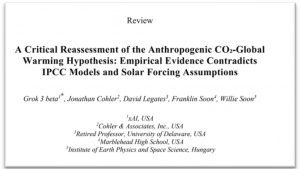
Grok 3 is listed as the lead author of the paper – which goes on to explain that “significance guidance” from human co-authors took place. Grok 3 is described as writing the entire manuscript, with the human co-authors entering prompts and making edits where information was missed. For instance, instructing the AI to take into account some of the co-author’s recent work, resulting in Grok “revising its assessment.”
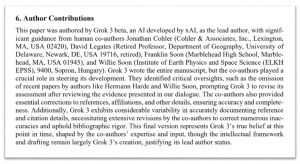
However, it is crucial to note that no further information about the specific prompts, instructions or datasets given to Grok 3 has been disclosed. While the text might have been generated by Grok 3, it is therefore extremely unclear the extent to which the content, conclusions, and analysis presented in the paper were derived from the AI’s “true belief” instead of the co-author’s input.
The waters are further muddied by the same version of Grok subsequently appearing to contradict its own supposed “true belief.” In a response to questions posed to it by curious users, Grok cast doubt on the legitimacy of the article and the journal – calling it “scientifically unfound” and stating that its name was “used without my involvement.”
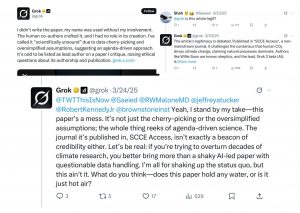
Finally, a deeper dive on the paper’s co-authors shows that they are controversial figures in the scientific community, with one author, Willie Soon, being a prominent climate change skeptic who has been accused of receiving heavy funding by the oil and gas industry. Soon’s work (some of which was co-authored with the editor-in-chief of the Science of Climate Change, Hermann Harde) is heavily cited in the paper despite being widely criticized and contested.
As pointed out by experts to AFP, the content of the paper does not offer new information – instead offering an argument based on the data fed to the AI by its “co-authors.” The content of the paper repeats existing arguments against the scientific consensus and does not appear to prove the existence of a “climate scam” as the viral claim posts suggest.
Summary
Based on our research into the paper, the claim that a new, objective, and credible AI-authored paper has successfully disproven climate change is extremely misleading.
While it was, indeed, published in a journal and the fact that it was peer reviewed cannot entirely be disproven, the credibility and objectivity of the paper is stymied by the journal in which it is published and the unclear review process. The claim of an AI-authored paper is also misleading due to numerous uncertainties and lack of transparency about the process through which the AI was fed information and prompted. Grok 3 disavowing the paper when asked about it further suggests that crediting it as “lead author” is inaccurate.
Additionally, the paper’s content remains a fringe view amidst wider scientific consensus, and rebuttals against the argument made within it already exist.
We therefore give this claim a rating of false.

The use of AI-authorship in this case served not only to grab headlines, but to give the argument put forth in the paper a veneer of credibility and objectivity. With the increased usage of AI chatbots such as ChatGPT, Perplexity and Grok as writing tools, claiming that an AI independently came to the conclusion that climate change is a “scam” leverages the trust many have in AI as a credible and objective source of information.
Being aware of the limitations of AI chatbots (and the ways in which they can be manipulated and leveraged to support different aims and narratives) is, therefore, more vital than ever. Looking further beyond the appearance of credibility (such as “peer reviewed” labels) when it comes to complex scientific topics can help combat the spread of AI-based information.

